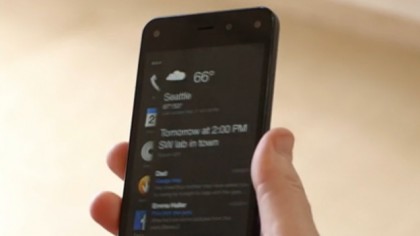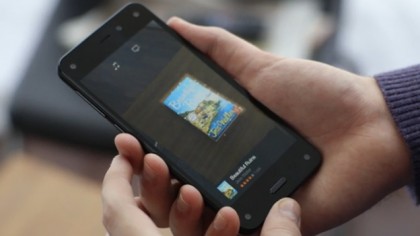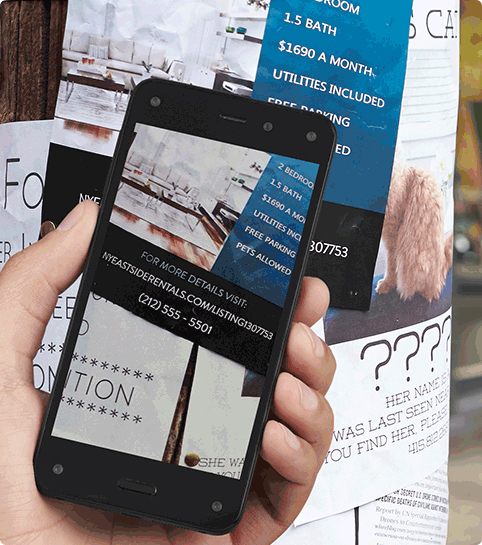Sign up for breaking news, reviews, opinion, top tech deals, and more.
You are now subscribed
Your newsletter sign-up was successful
Cameras

Technically, the Amazon Fire has a total of six cameras but for now we're going to talk about the ones that actually shoot images. The handset is equipped with a 13MP rear-facing camera with an f/2.0 lens.
The 13MP sensor might be not be too exciting when the LG G3 has a matching resolution imaging chip. The Galaxy S5, meanwhile, actually beats out the Amazon smartphone with a 16MP camera that can shoot 4K video.
That said, the Fire has the widest aperture lens whereas the LG G3 is trapped at f/2.4 and the Galaxy S5 and iPhone both have a f/2.2 lens. This wider lens should allow the Fire to capture more light at night. Amazon thus far has already touted its phone has clearer and sharper low-light capabilities than both Apple and Samsung.
Dynamic Perspective

Moving onto one of the most unique features Fire, Amazon's smartphone has four infrared cameras designed to track a user's face and orientation to the device. It's not 3D nor parallax; instead the Fire's entire interface is designed to present a 3D-like experience that shifts to match the user's gaze. Amazon is calling it Dynamic Perspective.
Integrated with maps, this added visual layer could allow users to see information "tucked" underneath such as Yelp ratings and reviews. For some more visual flair lockscreens and wall papers will have a 3D effect.
This perspective-skewing experience is only half the formula though as users will also be able to navigate on their phone using gesture controls. The Fire Phone has some beefed up accelerometers to take commands like one-hand tilting to scroll through a list of shopping items in the Amazon Shopping app.
Elsewhere, Fire users could the tilting controls while listening to music on the Amazon Music app to reveal song lyrics or auto-scroll through an article on the web.
Sign up for breaking news, reviews, opinion, top tech deals, and more.
Samsung has implemented similar camera-based, touch-less controls before with Air Gestures and eye-tracking smart scrolling. Both features have been around since the Samsung Galaxy S4 and while they work in most cases the features also require exaggerated motions to trigger.
So far it seems that Amazon's system is more responsive to minute movements. By comparison the LG G3 does nothing to track the users face or motion based commands other than accelerometer-controlled games.
Neither LG or Samsung's respective flagship handsets have a 3D element to their interfaces. Apple, meanwhile, is the only one that comes close to simulating a parallax effect, which was implemented with iOS 7, but it's only relegated to the lock and home screen where the icons appear to float above the background.
Features
Right off the bat Amazon is including free unlimited photo storage and a free year of Prime for anyone that picks up its first handset.
Along with the free-two day shipping on practically everything Amazon sells, Prime grants users access to unlimited streaming of movies and TV shows with Prime Instant Video. Amazon boasted that Fire owners will be able to watch over 200,000 videos, including exclusive content.
The free streaming also extends to Amazon's music library. Additionally users can borrow an e-book from the Kindle Owners' Lending Library of over 500,000 titles to choose from.
Additionally, Amazon hopes its Fire Phone will take off as a media device that can fling video to any Miracast device such as a Fire TV.
Apple has a similar AirPlay system set up for connecting users' iDevices to an Apple TV. Android users, meanwhile, can flick their video content from mobile phone to the Chromecast. Although these are both good options that work, Amazon wins out slightly simply because there are more devices that work on the Miracast standard.
Amazon's unique Mayday, "tell me how to use this device" feature also makes a return on the Fire phone with a dedicated physical button to trigger it no matter if the user is connected by 3G, 4G, or Wi-Fi.
Firefly

The Fire also has yet another physical button and this one is used to trigger the Fire's new Firefly feature.
While users have been able to use their smartphone cameras to scan barcodes and QR stamps, Firefly takes image based searching to a new level by identifying physical objects.
While using the feature, virtual fireflies will gather around any object captured by the phone's camera to identify and track down the object on Amazon's digital retail space.
What's more, the feature can be used to identify songs, TV Shows, and Movies based a small snippet of audio similar to Shazam for X-Ray information or a link to buy it from Amazon.
In some non-commercially oriented uses, Firefly could be used to identify paintings. The feature can also extrapolate text from a sign saving users the process of typing in a phone number and other information manually.
Price
For now the Amazon Fire Phone is only available on AT&T for starting price of $199 (about £120, AU$210) for the 32GB version with a two-year contract. Similarly, the Samsung Galaxy S5 comes at $199 (about £120, AU$210) but the big blue carrier only has a 16GB model available.
A similarly specced iPhone 5S can be had for $249.99 (about £147, AU$265.71) with a two -ear contract on AT&T.
The LG G3 release date, carrier and pricing details have since been revealed, and it too will run $199.99 on contract.
Very early verdict
It's clear Amazon is trying to build on its successful run of tablets by first announcing Fire TV and now a Fire Phone. It's not a truly stand out phone on specs alone but thanks to the company's massive cache of digital content and a few unique features, the Fire is a tantalizing new wrinkle in the mobile space.
Much of the talk surrounding the Fire up to its reveal pinned a new 3D interface as being the phone's most stand out feature. But in reality it's not parallax or a true three-dimensional experience, which leaves us a bit disappointed.
It's too early to call the Amazon Fire a sure buy handset, we'll wait - and all users should - until we see the interface first hand and run the phone's unique Firefly feature through a ringer of real world objects.
- 1
- 2
Current page: Cameras, features, price and the early verdict
Prev Page Design, display and specs
Kevin Lee was a former computing reporter at TechRadar. Kevin is now the SEO Updates Editor at IGN based in New York. He handles all of the best of tech buying guides while also dipping his hand in the entertainment and games evergreen content. Kevin has over eight years of experience in the tech and games publications with previous bylines at Polygon, PC World, and more. Outside of work, Kevin is major movie buff of cult and bad films. He also regularly plays flight & space sim and racing games. IRL he's a fan of archery, axe throwing, and board games.